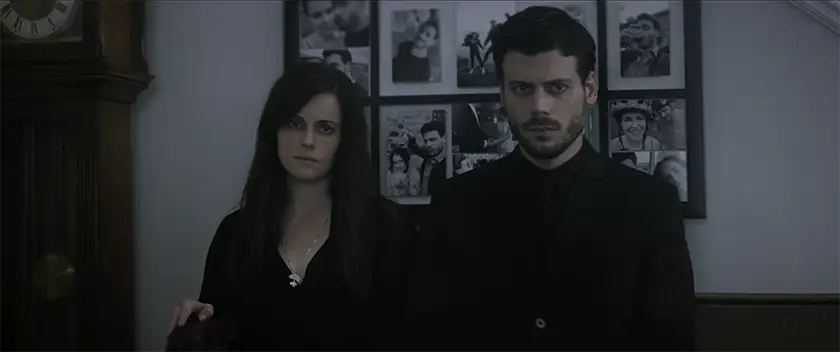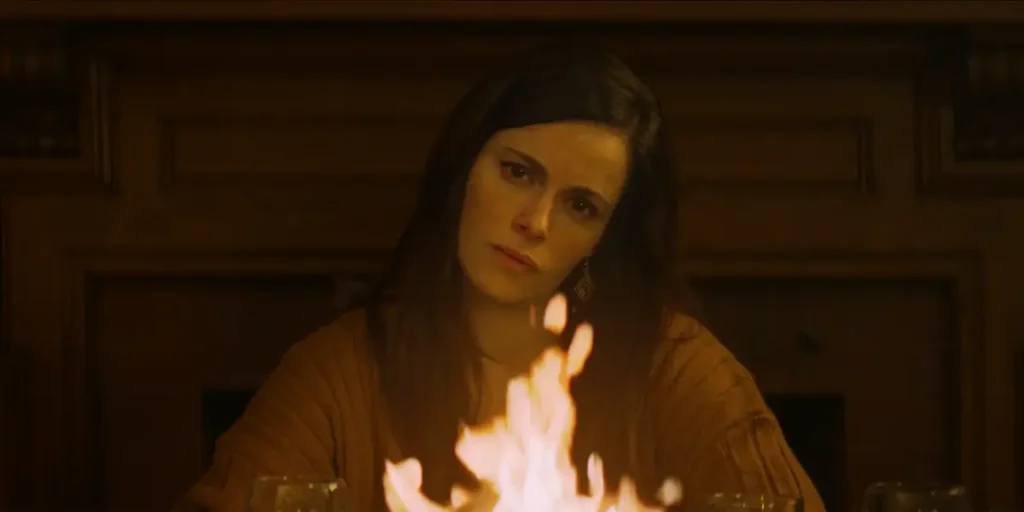Adam O’Brien’s supernatural horror film Mom takes us inside a haunted house and a tortured woman following the birth of her son.
Content Note: This review of Mom includes conversations about mental illness, postpartum depression, and infant death, which could be upsetting to some readers.
Director: Adam O’Brien
Genre: Supernatural Horror, Thriller
Run Time: 95′
U.S. Release: February 11, 2025
U.K. Release: February 17, 2025
Where to Watch: Digital & VOD
Every day around the world, more than 36,000 people become mothers. Of that number, somewhere between 6% and 20% go on to experience postpartum depression. In his film Mom, director Adam O’Brien looks at this experience through the lens of a haunted house story. Unfortunately, this movie doesn’t work either as an exploration of mental health or as a supernatural horror.
Meredith (Emily Hampshire, Schitt’s Creek) struggles to connect with her son Alex when she and her husband Jared (François Arnaud, Yellowjackets) bring him home from the hospital. As she experiences postpartum depression, it is amplified by a non-stop crying baby, a body that feels foreign to her, and a husband who seems to think that she can cheer up by going on a walk or just doing a little light cleaning around the house. As her depression blossoms into a full psychosis, Meredith finds herself in conversation with Alex as a little boy (Christian Convery) and also haunted by a figure who seems to be trying to offer some kind of warning.
Mom starts off almost immediately with a cheap jump scare, taking no time to build tension or characters. Rather than working to understand the dynamic that Meredith and Jared had prior to becoming parents and seeing that evolution after the birth of their son, we just see the aftermath, which makes it difficult to understand what their reactions to this situation say about them as people. Perhaps if the script had leaned into the haunted house aspect of the film, that might not have mattered as much, but the film doesn’t use that facet of the story to any real effect until the third act, instead focusing on Meredith’s increasing postpartum depressive symptoms.
Mild spoiler in the following paragraph
That is my primary frustration with Mom. Postpartum depression is already misunderstood and stigmatized – see the wildly broad statistic quoted above – and this movie amplifies that blame to the most horrific degree while not treating it with any kind of compassion or empathy. Instead, it uses a mental illness and Meredith drowning her son in the bath as a horror device without seeming to give a second thought to understanding it.
No further spoilers!

It is not as though the film is without any merit. Arnaud gives a compelling performance as a father who is struggling to understand what his wife is going through and then reacting as her mental health continues to deteriorate. He does a solid job of creating a character who is obnoxious in his oblivion without crossing into being someone wholly unlikeable.
Hampshire is an absolute star. Within the confines of a tremendously flawed script, she is still able to give a nuanced and thoughtful performance that salvages much of Mom. Whether in the midst of an outburst or near comatose on a couch, she imbues her character with a strong sense of personality. Hampshire’s involvement in this film will likely be a big draw, and her performance is one of the few bright spots.
The other positive is the movie’s look. The horror aesthetic is well done, and the deterioration of the house and Meredith’s mental health are echoed impeccably. This is yet another area where the other aspects of the film intensify the script’s weaknesses because the elements of Mom that work are truly impressive.
A decade ago, I experienced a stillbirth. It was the worst thing that has ever happened to me, and my depression following that was all-consuming. Thanks to therapy and a supportive partner, I am in a much better place now, and honestly, stories about those losses can be somewhat cathartic for me now if for no other reason than they help lessen the stigma surrounding loss and depression.
Horror has been used effectively to depict mental illness, with The Babadook being one of the most notable examples. Many people who experience postpartum depression feel as though they are ghosts of themselves while they are in the midst of it, so using a haunted house as a stand-in for that makes sense. However, Mom treats the mental illness itself as the spectre, creating more shame around something that is beyond anyone’s control. And that feels far more horrifying than any ghost story.
Mom: Movie Plot & Recap
Synopsis:
A mother experiences significant postpartum depression following the birth of her son. As her mental health deteriorates, the ghosts that inhabit her home become more and more persistent.
Pros:
- Emily Hampshire gives a compelling performance as a woman dealing with postpartum depression
- The visuals in the movie are well done
Cons:
- The script treats mental illness in a way that further stigmatizes it
- The horror aspects aren’t played as effectively as they could be
Mom will be released on digital platforms in the US on February 11, 2025 and in the UK on February 17.

